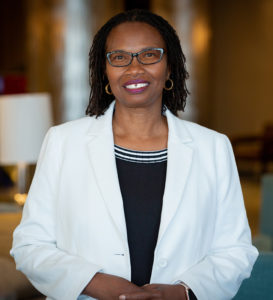BY Patricia L. Smith, TFN President & CEO
This message originally appeared in the TFN Newsletter, sent to network members and others on Oct. 30.
Tuesday, as we all know, is Election Day.
And while I will definitely be glad to see the end of nonstop campaign ads, piles of mailers and endless robocalls, I also know this:
Election Day is not the finish line. Not by a longshot.
Even the most optimistic timelines indicate we may not know the results of many races, including the presidential contest, until days if not weeks later.
If the vote is close in key states, the election could take weeks or months to be decided, with pitched battles heading to the courts and possibly Congress.
Factor in the specter of voter intimidation and suppression, and the fears of politically motivated violence, and you’ve got a recipe for many sleepless nights worrying that the fabric of civic life has become dangerously frayed if not shredded beyond repair.
I was proud to join more than 100 leaders in philanthropy calling for politicians and others in power to uphold the true values of a representative Democracy — including defending against efforts to suppress votes along racial lines or to thwart or overturn the will of the people.
It is certainly heartening to see so many people braving long lines and hours-long waits to cast ballots.
But I also see those long lines as not necessarily a feature of Democracy to be celebrated, but a flaw in the system that creates obstacles for people to exercise basic rights outlined in our Constitution.
And even high voter turnout for this election is a stark contrast to the typically low numbers that come out to vote in off-year local or even state elections.
In a perfect world, we would devote the same get-out-the-vote energy to those elections as well.
From the water we drink and the air we breathe to the curriculum taught in our schools and the oversight of police who patrol our neighborhoods — so much of what we care about can be championed or squashed at the local level, depending on whom we vote into those often overlooked down-ballot offices.
TFN recently hosted a webinar on philanthropy, advocacy and elections, featuring Abby Levine, director of the Bolder Advocacy Program at Alliance for Justice, which outlined some of the do’s and dont’s for foundations hoping to take more proactive policy stances.
The information Abby shared included useful tools for anyone who wants to see philanthropy more engaged and active in these times of high-stakes urgency. Chief among them: a 501(c)(3) organization may lawfully engage in some lobbying!
This year has cast a harsh light on what many have known for far too long: that we must continue to challenge and confront the systemic racism and xenophobia that create harmful policies and practices.
With much of the country seeing a spike in coronavirus cases and devastating economic downturns — twin crises that cause disproportionate harm to Black, Indigenous and Latinx people, among other hard-hit demographics — there is so much more hard work to be done. The philanthropic sector must use its voice and resources to help grantees advocate for federal, state and local legislative policies that foster equitable, sustainable, healthy prosperous communities.
In closing, I encourage you to take a moment to read this passionate blog post by Dion Cartwright, TFN’s director of equitable initiatives and leadership development.
“We must ask ourselves, ‘How am I contributing to these unjust systems and what power am I willing to give up or challenge in order to see true justice and liberation for all come to fruition?'” writes Dion, who leads our PLACES Fellowship and Alumni Network. “Our future is not dependent upon the results of this election. It is dependent on our resiliency as we face the gatekeepers of change.”
I’m proud to work alongside Dion and the rest of the TFN community of funders, partners and staff who inspire me to favor action over cynicism and hope over fear.
Not just on Election Day, but every day.
About the Author

Pat Smith is the president and CEO of The Funders Network, a membership organization comprised of more than 170 local, regional and national foundations across the U.S. and Canada committed to creating more sustainable, prosperous and equitable communities.
